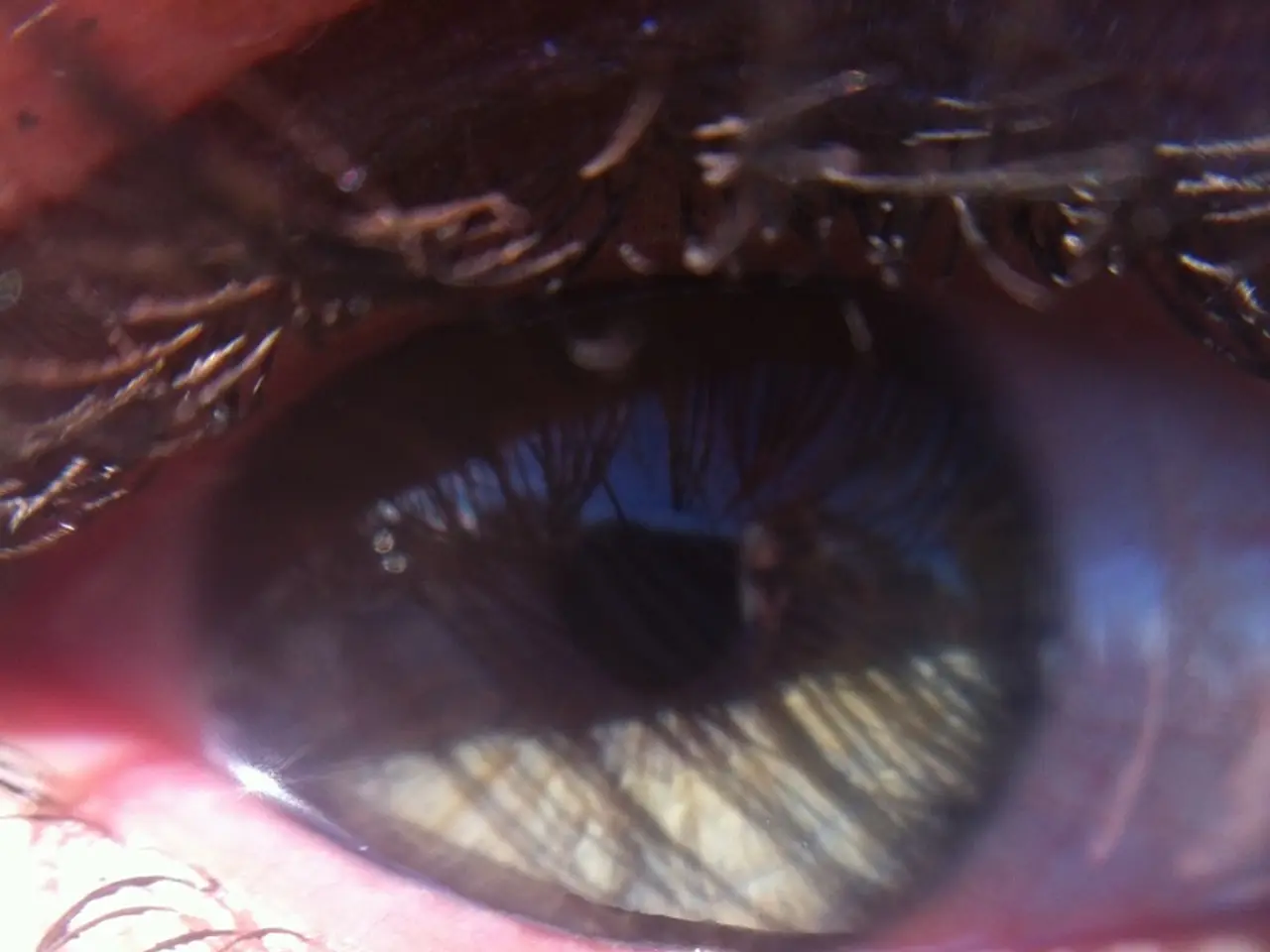Issues arising from unaddressed dry eye condition
Unchecked dry eyes can lead to significant problems for eye health and overall quality of life. This condition, characterised by a lack of sufficient tears to nourish and protect the eye's surface, can escalate into more serious complications if left untreated.
Dry eyes can result in a host of eye health risks. Persistent inflammation, corneal damage, increased risk of eye infections, and in severe cases, vision loss are all potential outcomes. The breakdown of the tear film, which normally protects and lubricates the cornea, leads to micro-abrasions or injuries on the cornea. These impair its ability to focus light properly, causing blurry or fluctuating vision [1][3][4].
In terms of quality of life, untreated dry eyes can cause chronic discomfort such as burning, stinging, redness, and a persistent gritty feeling. These symptoms can interfere with daily activities like reading, computer work, driving, and leisure, contributing to eye fatigue and visual disturbance. The discomfort and fluctuating vision can reduce productivity, increase frustration, and diminish enjoyment in routine tasks [4][5].
Key points to remember:
- Eye health risks: inflammation, corneal damage, infections, and in severe cases, vision loss [1][2][3].
- Visual impact: blurry and fluctuating vision due to an unstable tear film and corneal micro-injuries [1][4].
- Quality of life impact: chronic discomfort, eye fatigue, reduced ability to perform visual tasks, and general irritation that worsens over the day [4][5].
- Importance of treatment: Using artificial tears, prescription medications, and lifestyle adjustments can protect the cornea and preserve vision [1].
Untreated dry eyes can also lead to the development of eye-related issues such as infectious keratitis, corneal ulcer, scarring, depression, migraine, sleep and mood disorders [6]. The condition can be a financial burden with the cost of eye appointments, medications, supplements, or even surgery.
Dry eyes are a common condition, often caused by a lack of tear production or problems with secretion and draining tears. Risk factors include age 50 years or older, hormone changes in menopause and pregnancy, contact lenses, low vitamin A levels, certain medical conditions, certain medications, medical procedures like laser eye surgery, environmental factors, and lifestyle or workplace hazards [2].
Lifestyle changes can help manage dry eyes. These include avoiding smoke, wind, and air conditioning, using a humidifier, limiting screen time, taking frequent breaks from screens, wearing protective glasses, drinking 8-10 glasses of water daily, and getting at least 7-8 hours of sleep each night [3].
In conclusion, early diagnosis and ongoing management are crucial to prevent the long-term effects of untreated dry eyes. Regular check-ups with an eye care professional, along with adhering to strategies such as limiting screen time, blinking often, using artificial tears, and keeping the home environment cool and moist, can help safeguard eye health and quality of life.
- Untreated dry eyes might lead to the development of neurological disorders like migraines.
- Science has identified a link between dry eyes and sleep disorders, causing discomfort and affecting the quality of sleep.
- Adequate sleep is essential for overall health and wellness, including eye health, but dry eyes can disrupt this essential rest.
- Mental health conditions, such as anxiety and depression, can be exacerbated by both chronic dry eyes and insufficient sleep.
- Poor sleep can lead to decreased productivity at work, affecting one's career development and job-search success.
- In terms of financial consequences, untreated dry eyes may necessitate ongoing therapies and treatments, leading to increased healthcare expenditure.
- Managing personal finance becomes challenging when faced with unexpected medical costs, potentially leading to debt management issues and budgeting concerns.
- Education and self-development can offer valuable insight into strategies for budgeting and debt management.
- Skin health is another aspect that can be impacted by dry eyes, causing skin conditions like dryness, sensitivity, and inflammation.
- Skin-care routines might need to be adjusted to accommodate sensitive skin caused by dry eyes, which could require additional expense.
- Dry eyes can also be linked to other chronic diseases like diabetes, rheumatoid arthritis, and cardiovascular health problems.
- Maintaining overall health and wellness is crucial for managing chronic diseases, including digestive health, respiratory conditions, and cancer prevention.
- A balanced diet rich in necessary nutrients is an essential component of personal well-being, supporting various systems in the body, including immune function and skin health.
- Fitness and exercise are crucial for mental health and maintaining a healthy weight, improving energy levels and overall productivity.
- Mindfulness practices, such as meditation and deep breathing exercises, can help relieve stress, further improving mental health and productivity.
- Incorporating mindfulness into daily routines, such as during breaks from work, can help manage stress levels and maintain focus.
- Using CBD oil, a natural supplement, can contribute to managing some of the symptoms associated with dry eyes, improving sleep quality, and reducing stress levels.




